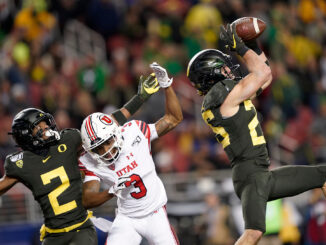
Willie Taggart is playing defense again.
On January 16, The Oregonian’s Andrew Greif reported that three Oregon football players had been hospitalized after going through what he called a series of “grueling strength and conditioning workouts.”
Oregon’s response was swift. New strength coach Irene Oderinde was suspended, the school asked journalism professor and Faculty Athletics Representative Tim Gleason to investigate the incident, and Taggart apologized.
But then last week, Taggart told Oregon’s student newspaper the Daily Emerald that, in retaliation for the story, he would no longer be speaking to Greif.
According to Taggart, Greif’s characterization of the workouts as grueling and “akin to basic military training” were unfair and contradicted what he told Greif before the story was published.
“When you’re not fair and honest, then to me that’s personal,” Taggart said. “When you do something that’s negative and it’s going to be personal, then I won’t have s— to do with you.
Taggart went further, taking issue with an ESPN appearance Greif made the day after the story was published.
“The story is out there, and then the next day you go on the ‘Outside the Lines’ and just not only stabbed me but turned the damn knife,” Taggart said. “He wanted his five or 10 minutes of fame and he got it.
Greif, for his part, told the Emerald that Taggart never disputed his characterization of the workouts. Had he done so, Greif said, he would have reported what the coach said
He also noted that the characterizations of workouts he used came from multiple sources within the program and were not disputed by Ducks spokespeople
Greif was backed up by Gleason, the journalism professor, who found that The Oregonian’s reporting was fair and that the coaching staff had made mistakes in the lead-up to the hospitalization of three of its players.
Greif, by the way, is an excellent reporter. He also broke the Oregon basketball sexual assault story in 2014.
This is a mess, and it’s Taggart who looks out of his depth. In a way, that’s understandable. We’re talking about a man who spent fifteen of his first eighteen years in college football playing and coaching at Western Kentucky.
For as highly as he’s regarded in the sport, Taggart’s head coaching experience consists of three years at WKU and four years at South Florida. He’s never had a job this big. Never had his every move scrutinized by major media.
The quotes to the Emerald were so over-the-top it’s almost hard to believe that he knew he was on the record when he was giving them.
Not only has Taggart taken a petty position, but the language he used to justify that position was laced with anger and entirely unprofessional.
Blacklisting the beat reporter from what is still the biggest and most widely read newspaper in the state after three months on the job is almost as tone-deaf – especially considering that Greif’s story was found by a third party to be fair.
In a moment in which the legitimacy of the press is more broadly under threat, Taggart’s actions here are troubling. But more troubling for Oregon’s narrow purpose is what those actions purport.
Taggart’s strength coach conducted workouts that landed three players in the hospital with serious medical problems.
The first steps taken by the university in the aftermath of the episode were the right ones. The coach was suspended. Taggart apologized.
But now, that apology feels hollow. Because Taggart actually appears to be unable, or at least unwilling, to accept responsibility for what happened.
Taggart’s frustration with the story is understandable. According to Gleason’s findings, a number of players disputed the militaristic characterization of the workouts.
But Taggart seems to believe that if Greif had changed the wording of his initial report, then the whole incident would have gone away. As he told the Emerald, the story “wouldn’t have been big if [Greif] didn’t write it the way he did.”
It’s delusional. Whether the workouts were militaristic or not, the fact that three players were hospitalized is not in dispute.
That’s the story. Was it a bad break? Perhaps – though putting linemen through highly intense workouts at 6 a.m. after six weeks off obviously has it’s risks.
But the bottom line is that, in this instance, Taggart failed to keep his players safe. He should know that, for a college football coach, there are fewer greater sins.
The answer here is not freezing Greif out for writing a story that every reporter in the world would have written. It’s owning up to what happened and learning from it.
Since his opening press conference – and a strong signing day notwithstanding – the start of Taggart’s reign at Oregon has consisted of one embarrassment after another.
By starting a war with The Oregonian, Taggart doesn’t just seem childish. He’s also ensuring that the original story – the one about three of his players being hospitalized – stays in the news.
These are unforced errors. That they’re cutting Taggart’s honeymoon in Eugene short is one thing. That they may be indicative of the character of a coach who isn’t ready for primetime is quite another.




“… has ‘its’ risks.” Nonetheless, this is an excellent article, Abe.
Taggart may or may not be ready for prime time but the story was rubbish.
you are the one not ready for prime time.. how old are you? 13?